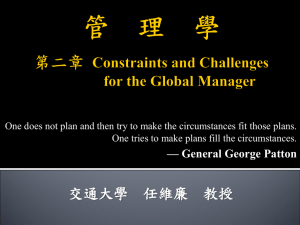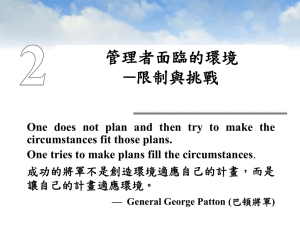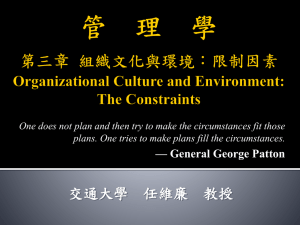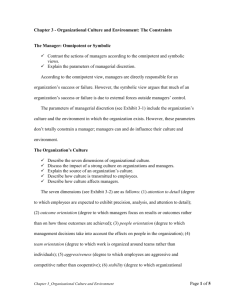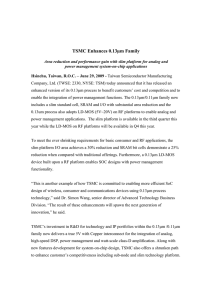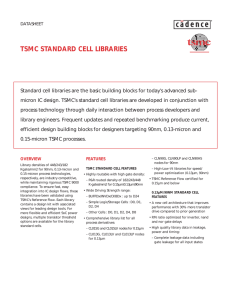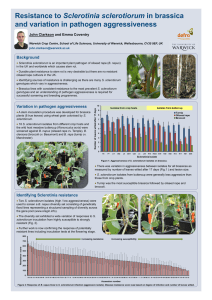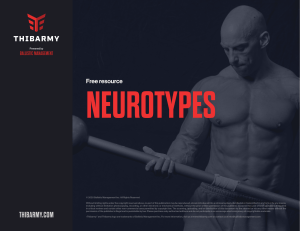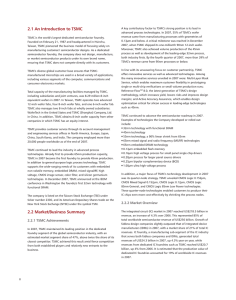Ch3 - 任維廉
advertisement
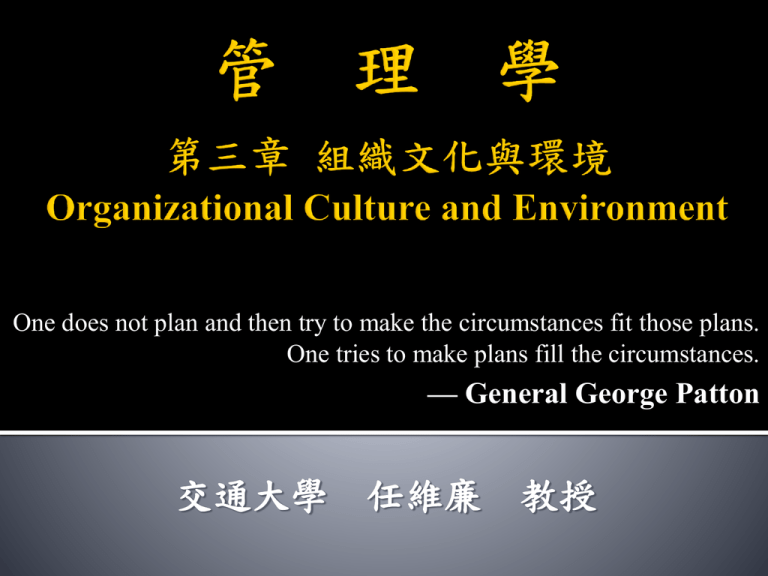
One does not plan and then try to make the circumstances fit those plans. One tries to make plans fill the circumstances. — General George Patton 交通大學 任維廉 教授 1. What is organizational culture? 交大?政大?TSMC? 2. What is environment? What is stakeholders? 交大?政大?TSMC? 3. How culture affects managers? How employees learn culture? How the environment affects managers? 2 1. 管理者:全能 (omnipotent) 或象徵 (symbolic) 2. 組織文化 (culture) 3. Current organizational culture issues 4. 組織環境 (environment) 3 1. 全能觀點 2. 象徵觀點 3. 綜合觀點 *真理在兩極端之間? 4 Managers are directly responsible for an organization’s success or failure. The quality of the organization is determined by the quality of its managers. 討論:切腹下台,提頭來見! 刻板印象,成功模式? 5 Much of an organization’s success or failure is due to external forces outside of managers’ control. The economy, governmental policies, technology, and the actions of previous managers…… *Managers’ Constraints: organization’s internal and external environment. 6 例:面對交警 Organizational Culture Managerial Discretion Organization’s Environment 7 1. 定義 (definition), 向度 (dimensions), 衡量 (measurement) 2. 起源,學習,影響 討論: 1. 人格特質 (personality) 之構面:big 5 (p.308) 2. OCA: organizational culture assessment, (Reigle, 2003) 8 A system of shared meanings and common beliefs held by organizational members that determines, in a large degree, how they act towards each other. Implications: Culture is a perception, shared, descriptive (evaluation). 討論:人人都是無價之寶! 9 1. 堅持高度職業道德 2. 專注於專業積體電路製造服務本業 3. 放眼世界市場,國際化經營 4. 注意長期策略,追求永續經營 5. 客戶是我們的夥伴 6. 品質,7.創新,8.工作環境,9.管理模式 10. 兼顧員工股東,回饋社會 10 Integrity(誠信正值) Customers are partners(客戶是夥伴) Innovation(製程創新) Commitment(對客戶承諾) *台積 DNA (天下): review, align…… 11 1. 2. 3. 4. 5. 6. 7. Discipline Transparence Independence Accountability Responsibility Fairness Social awareness *RD IS FAT, 蔡明介:勇氣深思, 誠信正直, 持續 學習, 團隊合作, 信任尊重, 創新思維。 12 13 Dimension Attention to Detail Outcome Orientation People Orientation Team Orientation Aggressiveness Stability Innovation and Risk Taking Organization A Organization B High Low Low Low Low High Low Low High High High High Low High 14 1. 繪製貴公司組織文化雷達圖。 實例:新竹縣文化中心 比較:政大,交大。華航,長榮。IBM, Apple. 討論:裕隆汽車次文化。效忠公司 vs. 專業。 2. 分析貴公司之組織環境, 討論:走向有利或不利之方向? 15 A公司 Innovation 4 3 Stability Attention to detail 2 1 0 Aggressiveness Outcome Team People 16 補習班 Innovation and risk taking 4 Stability B 補習班 C 補習班 3 Attention to detail 2 1 0 Aggressiveness Team orientation Outcome orientation People orientation 17 Are cultures in which key values are deeply held and widely shared. Have a strong influence on organizational members. *The HP Way, The McKinsey Mind Factors Influencing the Strength of Culture Size, Age, Employee turnover rate 18 Sources The organization’s founder: Vision and mission Past practices of the organization The behavior of top management Continuation Recruitment of like-minded employees who “fit” Socialization of new employees to help them adapt to the culture 19 Stories Narratives of significant events or actions of people Rituals Repetitive sequences of activities that express Material Symbols Physical assets distinguishing the organization Language Acronyms and jargon of terms, phrases, and word 20 飲水思源 Stay hungry, stay foolish. Be nice. Do your best, Keep it in perspectives. 21 皮質萬用盒 紅鉛筆(榮譽榜,講座) 紀念金幣 受邀參觀創辦人城堡 Bonus: 上網找經理人月刊, 2007.7, p.104 22 23 1. Creating an Ethical Culture High in risk tolerance Low to moderate aggressiveness Focus on means as well as outcomes *Be a visible role model. *Communicate ethical expectations. *Provide ethics training. *Visibly reward ethical acts and punish unethical ones. *Provide protective mechanisms. 24 2. Creating an Innovative Culture Challenge and involvement Freedom Trust and openness Idea time Playfulness/humor Conflict resolution Debates Risk-taking 25 3. Creating a Customer-Responsive Culture Hiring the right type of employees Having few rigid rules, procedures, and regulations Using widespread empowerment of employees Having good listening skills Reduce role ambiguity and conflict, increase job satisfaction (內部顧客) Having conscientious, caring employees willing to take initiative 26 4. Creating a culture that support Diversity Increasing heterogeneity in the workforce ▪ More gender, minority, ethnic, globalization…… Inclusive: 關羽,包拯,Johnny, Anderson…… Aging workforce: Older employees who work longer and do not retire, increased costs. ▪ 二次大戰後新生的大量嬰兒,被社會學家稱為 嬰兒潮世代(baby boom),紀律 ▪ 1960~1979, 五六年級,為X世代 (generation X), 27 七八年級為Y世代 ,創意,行銷 27 5. Workplace Spirituality Strong sense of purpose Focus on individual development Trust and openness Employee empowerment Toleration of employees’ expression 討論:威盛,長榮,杜俊元,游芳來。 28 1. 定義 2. 特定 (specific) 環境: CSCP 顧客,供應商,競爭者,壓力團體 3. 一般 (general) 環境: STEPGD 社會文化,科技 ,經濟,政治法律, 全球,人口統計。 *HMO, PEST, 寵物商機,少女化,一把槍一個子彈 29 Those factors and forces outside the organization that affect the organization’s performance. Components Specific: external forces that have a direct and immediate impact on the organization. General: broad economic, socio-cultural, political/legal, demographic, technological, and global conditions that may affect the org. 30 General Environment Suppliers Customers The Organization Public Pressure Groups Competitors Specific Environment 31 • Occupational Safety and Health Act of 1970 • Consumer Product Safety Act of 1972 • Equal Employment Opportunity Act of 1972 • Worker Adjustment and Retraining Notification Act of 1988 • Americans with Disabilities Act of 1990 • Civil Rights Act of 1991 • Family and Medical Leave Act of 1993 • Child Safety Protection Act of 1994 • U.S. Economic Espionage Act of 1996 • Electronic Signatures in Global and National Commerce Act of 2000 • Sarbanes-Oxley Act of 2002 • Fair and Accurate Credit Transactions Act of 2003 32 Environmental Uncertainty ▪ Complexity of the environment: the number of components in an organization’s external environment. ▪ Degree of change in environmental components: how dynamic or stable the external environment is. 33 34 Any constituencies in the organization’s environment that are affected by the organization’s decisions and actions Stockholders, Shareholders 35 36 1. 利潤最大化 2. 股東財富最大化 3. 市場佔有率 4. 顧客忠誠度 5. 員工滿意度 6. 其他 Stakeholders 37 1. Case study: a manager’s dilemma (p.60) 2. Thinking critically about ethics (p.68) 3. Internet-based exercise (p.82) *3. choose a student organization, evaluate its culture *4. choose two organizations, identify their stakeholders *5. choose two organizations, compare their GE, SE 38 比較:1. 管理者之全能,象徵觀點 2. 個人人格 VS. 組織文化 3. 一般環境 VS. 特定環境 39 1.全球經濟持續成長 2. 藝術取代運動 3. 走向資本主義 4. 流行文化 5. 解除管制 6. 太平洋經濟重心 7. 女性出頭 8. 生物科技及爭議 9. 宗教復甦 10. 重視個人貢獻 常用詞: change, greenwashing, Chinglish… 新創詞: leisure sickness, cyberchondriac, youthanasia… 40 omnipotent view symbolic view organizational culture strong cultures socialization workplace spirituality external environment specific environment general environment environmental uncertainty environmental complexity stakeholders 41
